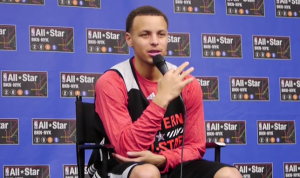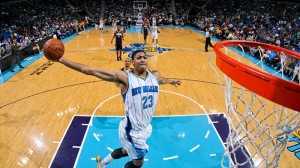 This season’s MVP race is shaping up to be the best one in quite some time. The perceived top five candidates this season – James Harden, Stephen Curry, Anthony Davis, LeBron James and Russell Westbrook – represent the top five in PER, three of the top five in win shares and lead the NBA in nearly two dozen major statistical categories.
This season’s MVP race is shaping up to be the best one in quite some time. The perceived top five candidates this season – James Harden, Stephen Curry, Anthony Davis, LeBron James and Russell Westbrook – represent the top five in PER, three of the top five in win shares and lead the NBA in nearly two dozen major statistical categories.
We’re pretty well covered with MVP rankings on this site with Sheridan’s regular updates, and other staffers have chimed in as well. So this column will be devoted to throwing out some analytic pros and cons for this season’s quintet in the running for the league’s most prestigious award.
James Harden, Shooting Guard, Houston Rockets
Harden has taken his game to a new level as the unquestioned alpha dog for the Rockets, leading the league in minutes played, free throws and attempts, total points, offensive win shares and total win shares. He also has added actual effort on the defensive end. Not only is Harden isolated on more possessions than any player in the game, his frequent aggressive and assertive drives to the basket are detailed in this chart.
| Harden Driver | Number | League Rank |
| Total Points | 492 | 1 |
| Team PPG | 14.6 | 1 |
| Player PPG | 7.9 | 2 |
| Total Drives | 673 | 3 |
| Drives Per Game | 10.9 | 6 |
In GM Daryl Morey’s layups, free throws and threes universe, Harden’s ability to get to the basket and attract defenders is a major reason why Houston has the sixth-best scoring offense in the league.
But here’s the catch with Harden: The NBA began to track turnovers as a statistic in the 1977-1978 season. Since that time, no player that won the MVP award has ever led the league in turnovers. Harden only has 16 more turnovers than second-place John Wall, but do you really think the league’s MVP should also have the most turnovers? It’s never happened before for a reason.
Stephen Curry, Point Guard, Golden State Warriors
 Curry is the NBA leader in made 3-pointers, total steals, steals per game and win shares per 48 minutes. Though he plays on the league’s best team, no player does more for his team while he’s on the floor than Curry. Golden State is plus-11.5 points per game while Curry is on the court, per NBA.com. That translates into a plus-16.7 per 48 minutes, making Curry the most impactful player in the game today.
Curry is the NBA leader in made 3-pointers, total steals, steals per game and win shares per 48 minutes. Though he plays on the league’s best team, no player does more for his team while he’s on the floor than Curry. Golden State is plus-11.5 points per game while Curry is on the court, per NBA.com. That translates into a plus-16.7 per 48 minutes, making Curry the most impactful player in the game today.
The problem is that he may not be on the floor enough to merit the MVP award.
We’re in a wonderful age in the NBA where players are being rested more to be fresh later in the season. But an MVP almost always shoulders the load for his team. Curry happens to lead his team in minutes, but plays just 33.1 per game.
No player voted MVP over the last 25 years won the award while playing as few minutes per contest as Curry has played this season, according to Basketball-Reference. Steve Nash’s 2004-2005 MVP season, where he logged just 34.3 minutes per game, is the closest. Should the league’s MVP really spend roughly 15 minutes per game on the bench?
Anthony Davis, Forward/Center, New Orleans Pelicans
Davis leads the league in 2-point field goals, blocks per game and PER, as colleague Michael Scotto noted, quickly developing into the best big man in the game – and he just turned 22 this week. Davis’ mid-range game is already strong, but his 12.3 paint points per game is second in the league to Dwight Howard’s 12.4, per NBA.com. And you can forget about stopping Davis once he gets  near the basket.
near the basket.
Davis has hit 71.7 percent of his field goals within five feet of the hoop, according to NBA.com, which is third in the league among players with at least 300 attempts. His individual numbers are really impressive, but shouldn’t the MVP award also be about how much his team achieves?
Davis is without question one of the league’s five best players. But at some point, being awarded the most valuable player means you have to elevate your team among the league’s best at something, anything. New Orleans is not in the top 10 in points scored, points allowed, assists or rebounds per game. An MVP’s team has always been in the top 10 at something. Davis is an analytic darling, but simply getting your club into a 16-team postseason – which is still in qurestion – may not be enough.
LeBron James, Forward, Cleveland Cavaliers
It’s interesting that James is still an MVP contender despite having a down season – for his standards. His field goal percentage is at its lowest level in six years. His scoring average, a mere 26 points per game, is the lowest it’s been since his rookie season. And yet here he is in the discussion with the league lead in made field goals and points per game off of turnovers with 5.3.
 Since the All-Star break, James has had an elite 98 defensive rating while shooting 50 percent from the field and 39 percent from the arc.
Since the All-Star break, James has had an elite 98 defensive rating while shooting 50 percent from the field and 39 percent from the arc.
However, to be a true MVP, you should probably be the most valuable player on your own team without a shadow of a doubt. So who leads the Cavaliers in win shares? That would be Kyrie Irving, with 8.3 to James’ 8.0.
The last time an MVP didn’t lead his own team in win shares was Steve Nash for the 2005-2006 Suns, when he trailed teammate Shawn Marion, per Basketball-Reference. And many argue that Nash should not have won his two MVP awards from an analytic standpoint. We have too many strong candidates this year to award an MVP to someone who doesn’t lead his team in win shares.
Russell Westbrook, Point Guard, Oklahoma City Thunder
Let this next sentence sink in for a bit. In 10 games since the All-Star Game, Westbrook is averaging a triple-double. with 33.3 points, 11 assists and 10.1 rebounds. He has vaulted to the league lead in scoring average, assist percentage and usage percentage. His seven triple-doubles this season are already the most any player has had since James had seven in 2008-2009 – when he won his first MVP.
Where Westbrook has done the most damage all season has been in transition:
| Westbrook Transition | Number | League Rank |
| Fast Break PPG | 7.9 | 1 |
| Possessions | 381 | 1 |
| Fast Break Total Pts | 424 | 1 |
Nobody has gone on the fast break more or scored more points in transition this season than Westbrook. With Kevin Durant still recovering from his second foot surgery of the season, few players in recent memory have carried his team like Westbrook has carried the Thunder of late.
Yet take a look at the last 10 MVP’s and their field goal percentages, shall we?
| MVPs | Year | Team | FG % |
| Kevin Durant | 13-’14 | OKC | 50.3 |
| LeBron James | 12-’13 | MIA | 56.5 |
| LeBron James | 11-’12 | MIA | 53.1 |
| Derrick Rose | 10-’11 | CHI | 44.5 |
| LeBron James | 09-’10 | CLE | 50.3 |
| LeBron James | 08-’09 | CLE | 48.9 |
| Kobe Bryant | 07-’08 | LAL | 45.9 |
| Dirk Nowitzki | 06-’07 | DAL | 50.2 |
| Steve Nash | 05-’06 | PHX | 51.2 |
| Steve Nash | 04-’05 | PHX | 50.2 |
With his 43.3 field goal percentage, Westbrook isn’t within a single percentage point of any of the last 10 MVPs. Sure, he has been astronomically impressive over the last month, but the MVP is a season-long award. And Westbrook won’t cut it with his current shooting percentages.
Shlomo Sprung is a national columnist for SheridanHoops who focuses on analytics, profiles and features. He is also the web editor of the Brooklyn Daily Eagle. A 2011 graduate of Columbia University’s Journalism School, he has previously worked for the New York Knicks, The Sporting News, Business Insider and other publications. You should follow him on Twitter.